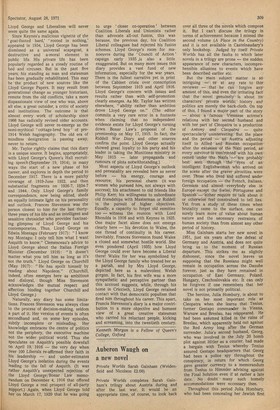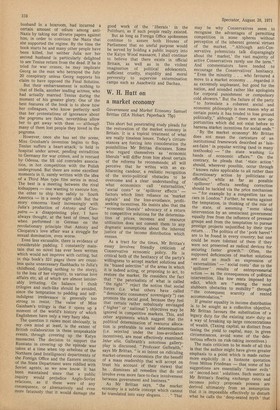Auberon Waugh on a new novel
Private Worlds Sarah Gainham (Weidenfield and Nicolson E2.00) Private Worlds completes Sarah Gainham's trilogy about Austria during and after the last war. It would be an appropriate time, of course, to look back
over all three of the novels which compose it. But I can't discuss the trilogy in terms of achievement because I missed the
second volume (A Place in the Country) and it is not available in Castelnaudary's only bookshop. Judged by itself Private Worlds has all the faults to which later novels in a trilogy are prone — the sudden appearance of new characters, incomprehensible allusions to events which have been described earlier etc.
But the main subject matter is so intriguing or at any rate to this reviewer — that he can forgive any amount of this, and even the irritating fact' that the novel genuinely'. is about its characters' private worlds; history and politics are merely the back-cloth. On top of this, I found a major part of the story — about a famous Viennese actress's relations with her second husband and with her part of Cleopatra in a production of Antony and Cleopatra — quite spectacularly uninteresting: But the place and the period 'aii Austria adjusting itself to Allied and Rnssian occupation after the excesses Of the 'NW period, as every survivor. iiieorifrOnted ' with his own
record 'under the 'Medi§ 1,=---e.bare probably best seen through '''th'''eyes of an intelligent Englishworriati who arrived on the scene after the graVer atrocities were over. Those who lived And suffered under foreign Occupation the French, Italians, Germans and almost everybody else in Europ0-except the ' 'Swiss, Portuguese and Spanish' — 'either require' to talk about it or otherwise feel constrained to tell lies. Yet from a study of these times when brutality came to the surface, one can surely learn more of value about human nature and the necessary restraints of human society than from almost any other period of history.
Miss Gainham starts her new novel in 1951, just six years after the defeat of Germany and Austria, and does not quite bring us to the moment of Russian departure. This strikes me as slightly dishonest, since the novel leaves us supposing that the Russians might well remain in occupation across the Danube forever, just as they have remained in occupation of East Germany, Poland, Hungary, Czechoslovakia etc. It can only be forgiven if one remembers that her novel is not primarily political.
The heroine, Julia Hombury, is about to take on her most important role as Cleopatra when she learns that Tenius, former Gestapo commander in Vienna, Warsaw and Breslau, has reappeared. He had been assumed killed in the ruins of Breslau, which apparently held out against the Red Army long after the German surrender. Julia's second husband, Georg, who was involved in the July 20 bomb plot against Hitler as a courier, had made a bargain with Tenius whereby Tenius assured Gestapo headquarters that Georg had been a police spy throughout the conspiracy, in return for which Georg gave greater currency to a memorandum from Tenius to Himmler advising against the Final Solution even if at rather a late date. No doubt many such homely accommodations were necessary then.
Throughout this period Julia Hombury, who had been concealing her Jewish first husband in a boxroom, had incurred a certain amount of odium among antiNazis by taking out divorce papers against him, in order to convince the Nazis that she supported the regime. By the time the book starts he and many other people have been killed, but neither Julia nor her second husband is particularly delighted to see Tenius return from the dead. If he is tried for war crimes, he may implicate Georg as the man who betrayed the July 20 conspiracy unless Georg supports his -claim to have opposed the Final Solution.
But their embarrassment is nothing to that of Hella, another leading actress, who had actually married Tenius during the moment of his greater glory. One of the best features of the book is to show how her colleagues, who know perfectly well that her protestations of ignorance about the pogroms are false, neverthless allow her to get away with them — although many of them lost people they loved in the pogroms.
However, once she has set the scene, Miss Gainham's invention begins to flop. Tenius suffers a heart-attack, is held in hospital under arrest, pending extradition to Germany for war crimes, and is rescued by Odessa, the SS old comrades association, in hot competition with the Polish underground. But there are some excellent moments in it, surely written with the idea of a Third Man type film series in mind. The best is a meeting between the rival kidnappers — one wanting to execute him, the other to ship him safely to South America — in a seedy night club. But the story concerns itself increasingly with Julia's production of Antony and Cleopatra — a disappointing play, I have always thought, at the best of times, but when performed in German on the revolutionary principle that Antony and Cleopatra's love affair was a struggle for sexual domination, even worse.
Even less excusable, there is evidence of considerable padding. I constantly maintain that no novel has ever been written which would not improve with cutting, but in this book's 321 pages there are countless quite unnecessary flashbacks to Julia's childhood, (adding nothing to the story), to the loss of her virginity, to various love affairs etc, all of which are almost intolerably irritating. On balance, I think trilogies and such-like should be avoided, since the temptation to padding and selfindulgent irrelevance is generally too strong to resist. The value of Miss Gainham's trilogy is that it opens up a moment of the world's history of which Englishmen have only a very hazy idea.
The question it raises most obviously, in my own mind at least, is the extent of British collaboration in these unspeakable events, through covering up the Katyn massacres. The decision to support the Russians in covering up the episode was taken at a time when top echelons of the Northern (and Intelligence) departments of the Foreign Office and the Eastern section of the State Department were riddled with Soviet agents, as we now know. It has been maintained since that a public inquiry would prejudice Anglo-Soviet relations, as if these were of any consequence, or alternatively and even more fatuously that it would damage the good work of the ' liberals ' in the Politburo, as if such people really existed.
But as long as Foreign Office spokesmen continue to assure both Houses of Parliament that no useful purpose would be served by holding a public inquiry into the Katyn Wood massacre, I shall continue to believe that there exists in official Britain, as well as in the violent imagination of political adolescents, sufficient cruelty, stupidity and moral perversity to supervise extermination camps such as Auschwitz and Dachau.



































 Previous page
Previous page